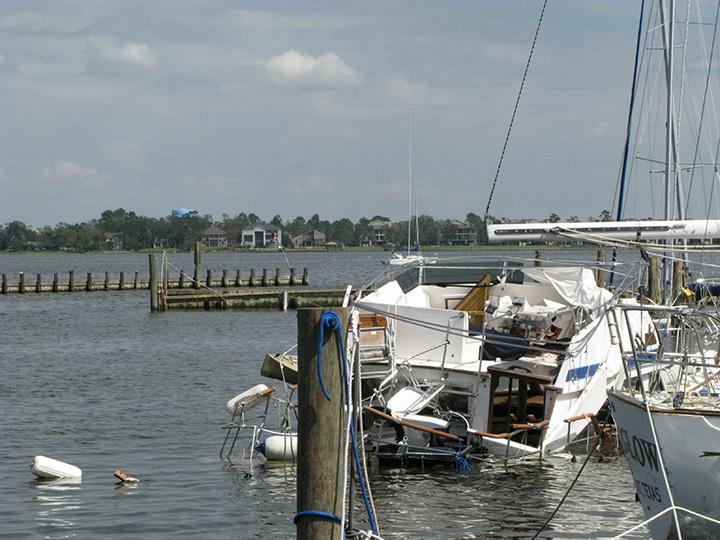
The secrets of a stormproof marina
by Scott Croft 11 Sep 2019 13:45 UTC

During a hurricane, a low breakwater like this one offers little protection to boats in a marina © Scott Croft
The statistics prove that hauling your boat out of the water and storing it ashore before a hurricane strikes greatly lowers the chance you'll need to file an insurance claim after the storm passes.
However, Boat Owners Association of The United States (BoatUS) also knows that it's often not possible to haul every boat out in time. For those boat owners whose options are limited to weathering a storm in a marina, here are four signs that boaters can look for to help them evaluate their own marinas and lower the odds for storm damage.
- What's the plan? A marina should have a comprehensive hurricane plan that outlines who does what when a storm approaches. Slipholders may have to sign a pledge to secure their boats properly, whether ashore on in the water. Remember that a marina is a community - just one poorly prepared or not-prepared-at-all boat can be the weak link that leads to wider damage to others. Joining a "hurricane club" (often with a deposit or fee) can put you on a priority list for hauling out when a storm approaches.
- Protection from wind and waves: Open water in front of a marina, even just a mile or two, is the biggest enemy of boats during a storm. Look for tall breakwaters with small channel openings to the big water outside. Smaller, lower breakwaters may be underwater during a surge. A marina's bulkheads should be on the tall side and not in need of immediate repair. High earthen banks or other landforms around a marina can help keep the worst of the wind at bay.
- For floating docks, think tall: According to the BoatUS Catastrophe Team, floating docks often fare better than fixed docks in a storm - but only if pilings holding the docks are tall enough to handle a high surge. Even a Category 2 storm (96 - 110 mph) will have a surge of 6 to 8 feet or more. Cleats should be heavy and well-attached through the framing.
- Fixed docks: Loose pilings and rotting wood are sure signs that a failure could happen in a storm. Taller pilings make it easier to attach longer lines to help adjust for the surge. Cleats need to be thru-bolted through a substantial structure in wood docks. Loose planks can be carried away in the surge, making accessing your boat after the storm harder and more dangerous. For all docks, larger slips allow more room for movement without banging into the dock.
If you would like to learn about more hurricane boat storage options, including what to do when storing a boat ashore or when it not may be a good idea to leave your boat in a lift, go to BoatUS.com/Hurricanes for a free downloadable copy of the new
BoatUS Magazine Hurricane Preparation Guide.